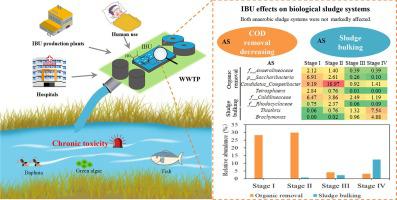Environment International ( IF 11.8 ) Pub Date : 2020-11-20 , DOI: 10.1016/j.envint.2020.106265 Yanyan Jia , Samir Kumar Khanal , Linwan Yin , Lianpeng Sun , Hui Lu

|
Ibuprofen (IBU) is one of the frequently detected non-steroidal anti-inflammatory drugs (NSAIDs) in wastewater treatment plants (WWTPs) and aquatic environment. However, little is known about the effect of IBU and its biotransformation products (TPs) on different biological sludge systems and aquatic environment. The effects and toxicity of IBU and TPs on three biological sludge systems (i.e., activated sludge (AS), sulfate-reducing bacteria (SRB)-enriched sludge and anaerobic methanogenic (AnM) sludge systems) and aquatic environment were comprehensively evaluated through a long-term operation of three bioreactors and a series of batch experiments. Both of the SRB-enriched sludge and AnM sludge systems were not affected under a long-term exposure to IBU, based on removing organic carbon and sulfur and producing methane. This could be attributed to the high tolerance of functional microbes in the SRB-enriched sludge (e.g., genus Desulfobacter) and AnM sludge systems (e.g., genus Candidatus Methanomethylicus) for IBU. In contrast, IBU had some apparently inhibitory effects on the AS system, such as reduced organic removal efficiency and poor sludge settling. The analysis on microbial community revealed that IBU significantly inhibited the genera involved in organic degradation (e.g., genus Candidatus Competibacter) and also stimulated those genera (e.g., genus Brachymonas) to secret excess extracellular polymeric substances (EPS), which thus caused sludge bulking in the AS system. The toxicity of IBU and its TPs in the effluent of the AS system was also investigated with Vibrio fischeri bioluminescence inhibition tests and quantitative structure activity relationship (QSAR) analysis by ecological structure-activity relationship (ECOSAR) program. The results indicated that the AS system could effectively eliminate the acute toxicity of both IBU and TPs, but a potential chronic toxicity of IBU could still existed, which could be more harmful to aquatic organisms than that of its TPs. These findings provide an insight into the toxic effects of IBU and its TPs on biological sludge systems and ecosystem.
中文翻译:

布洛芬及其生物转化产物对不同生物污泥系统和生态系统的影响
布洛芬(IBU)是废水处理厂(WWTP)和水生环境中经常检测到的非甾体类抗炎药(NSAID)之一。但是,关于IBU及其生物转化产物(TPs)对不同生物污泥系统和水生环境的影响知之甚少。长时间地综合评估了IBU和TPs对三种生物污泥系统(即活性污泥(AS),富含硫酸盐还原细菌(SRB)的污泥和厌氧产甲烷(AnM)污泥系统)的影响和毒性以及水生环境。三个生物反应器的长期操作和一系列分批实验。基于去除有机碳和硫并产生甲烷,在长期暴露于IBU的条件下,富含SRB的污泥和AnM污泥系统都不会受到影响。用于IBU的Desulfobacter和AnM污泥系统(例如Methanomethylicus假丝酵母属)。相反,IBU对AS系统具有明显的抑制作用,例如降低的有机去除效率和较差的污泥沉降。上微生物群落分析表明,IBU显著抑制参与有机降解(例如,属的属暂定Competibacter),并且还刺激那些属(例如,属Brachymonas)到秘密过量细胞外聚合物质(EPS),其因此导致污泥膨胀在AS系统。还用费氏弧菌调查了IBU及其TP在AS系统废水中的毒性通过生态结构-活性关系(ECOSAR)程序进行生物发光抑制测试和定量结构活性关系(QSAR)分析。结果表明,AS系统可以有效消除IBU和TPs的急性毒性,但是IBU仍可能存在慢性毒性,对水生生物的危害要比其TPs更大。这些发现提供了对IBU及其TPs对生物污泥系统和生态系统的毒性影响的见解。


























 京公网安备 11010802027423号
京公网安备 11010802027423号